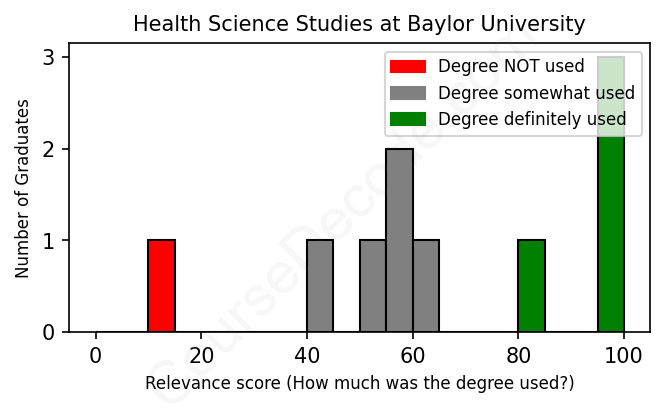
First, some facts. Of the Health Science Studies graduates from Baylor University we've analyzed , here's how many have used (or NOT used) their degree in their career:

These are estimates based on AI analysis of 10 LinkedIn profiles (see below).
The verdict? On par with the average. Overall, with an average relevance score of 67%, Health Science Studies graduates from Baylor University have about the same likelihood of finding work in this field as the average graduate across all fields:
And for comparison, here's the chart for all profiles we've looked at across all degrees.
Also, after graduating, 60% of these graduates have pursued further education other than another Bachelor's degree (such as a Masters degree or other), compared to the average across all profiles of 35%. This suggests you may need more than just a Bachelors degree to be competitive as a Health Science Studies graduate.
See the details:
|
Relevance score: 54% We think this person has gone into a career only somewhat relevant to their degree. We think this person has gone into a career only somewhat relevant to their degree.
DEGREE INFOGraduated in 2021 from Baylor University with a Bachelor of Science - Education in Health Science Studies. No other secondary education since. JOB HISTORY SINCE GRADUATIONAthletic Training Clinic Intern James E. Taylor High School Jun 2021 - Aug 2021 Mentorship Committee Mentor  Baylor Medical Student Association Jan 2021 - Dec 2021 Academic Tutor  Alvin Community College Jun 2022 - May 2023 ABOUTNo information provided. |
The top 10 most common jobs done by the graduates we've analyzed (ranked most common to least) are:
Looking at the job history of Baylor University graduates who studied Health Science Studies, a few common themes emerge. Many of these individuals have gone on to work in healthcare roles such as Physician Assistants, Occupational Therapists, and various types of health educators. These jobs typically require specialized knowledge and skills that are directly connected to their degree, highlighting a strong alignment between their academic background and professional paths. For example, roles like Physician Assistant and Occupational Therapist clearly utilize the foundational health science principles they learned during their studies.
On the other hand, not every job these graduates took is closely related to health sciences. Positions like Supervisor at Group Excellence or various insurance-related roles show a disconnect between their educational focus and job responsibilities. These roles tend to emphasize management or sales rather than health-related skills. Overall, while many graduates are indeed working in relevant fields that directly apply their degree, a significant number have ventured into positions that only partially connect to their health science studies, indicating a mix of relevance in their career paths.
Here is a visual representation of the most common words in job titles for Health Science Studies graduates (this is across all Health Science Studies graduates we've analyzed, not just those who went to Baylor University):

When you look at the career trajectories of Baylor University graduates with a degree in Health Science Studies, it's pretty clear that many of them quickly gravitate towards healthcare-related roles after graduation. For those who graduated around 2010, we see a strong move into positions like Physician Assistants and public health educators, which demonstrates a clear alignment with their studies. Fast forward five to ten years, and this isn't just a one-off trend. Many maintain their focus in healthcare settings, taking on specialized roles like Population Health Specialists and Diplomats in larger organizations, which likely build on their initial experiences. Overall, it seems like those early career moves lead to solid, relevant positions in the field of health science.
However, not every path is as focused. Some graduates find themselves in roles that are somewhat tangential to their degree, like insurance sales or teaching. For instance, graduates from 2019 ended up in various jobs ranging from health education to being licensed insurance agents, which can feel pretty removed from the core health science discipline. As you look at the years following graduation, there’s a mix of those who pivot back to more traditional health roles, like occupational therapists or cognitive therapists, and others who seem to drift away from the core health science focus altogether. In the end, while a substantial number of these graduates find meaningful careers in healthcare, there’s also a notable percentage that explore different avenues, illustrating a diverse range of outcomes for Baylor’s health science alumni.
Getting a Bachelor’s degree in Health Science Studies can be a bit of a mixed bag—it’s not the easiest path, but it’s also not the hardest out there. At Baylor University, you’ll be diving into courses that cover everything from biology and anatomy to public health and ethics, which means you’ve definitely got to be ready to hit the books and stay on top of your assignments. Some students find the blend of scientific stuff and practical applications really interesting, while others might feel it gets pretty intense at times, especially with lab work or research projects. Overall, it’s a solid challenge, but if you stay organized and engaged, you can definitely do well!
Most commonly, in the LinkedIn profiles we've looked at, it takes people 4 years to finish a Bachelor degree in Health Science Studies.
So, looking at these Baylor University Health Science grads and their job paths, it seems like they’re doing okay financially, but it really varies from person to person. The first grad, who's a Physician Assistant, is probably making some decent bucks since PAs can rake in a good salary, especially in specialty fields like gastroenterology. Others, like the Public Health Educator and some recent grads, started in roles that are likely lower-paying, which is kinda common when you’re getting your feet wet after school. Then you've got those more specialized roles, like Occupational Therapists, who usually do pretty well too. Overall, many of them are on a good trajectory that should pay off down the road, but they might not be rolling in cash just yet, especially earlier in their careers.
Here is a visual representation of the most common words seen in the "about" section of LinkedIn profiles who have a Bachelor degree in Health Science Studies (this is across all Health Science Studies graduates we've analyzed, not just those who went to Baylor University). This may or may not be useful:

Here are all colleges offering a Bachelor degree in Health Science Studies (ordered by the average relevance score of their Health Science Studies graduates, best to worst) where we have analyzed at least 10 of their graduates:
| College | Score | Count |
|---|---|---|
 Baylor University Baylor University
|
67 | 10 |